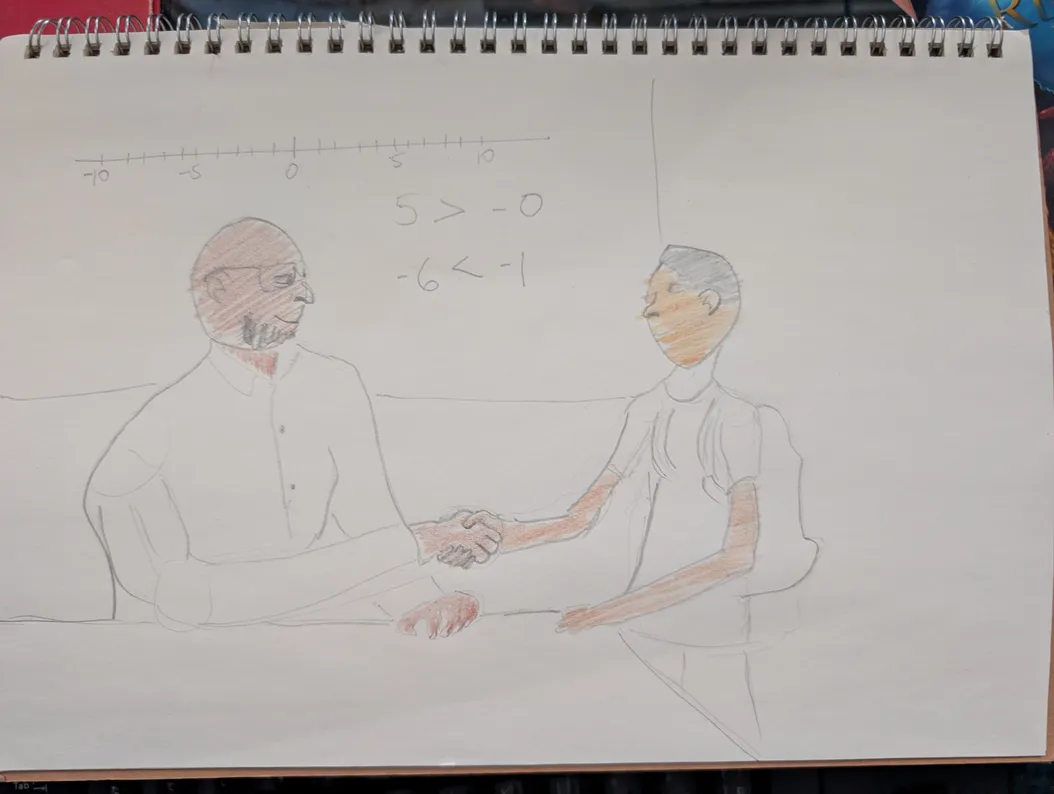Video
Audio
Text
Success gets noisy when you grow up. It becomes tangled in numbers: followers, sales, rankings, subscriber counts, algorithms. You chase metrics that keep moving, as if the world expects you to clear a higher bar every year just to prove you’re still serious.
But yesterday at Lied STEM Academy, success shrank back down to human scale. Sixth-grade size. The kind where awe is genuine, respect is earned, and possibility feels like an open door instead of a distant future.
Fourth Period: Chaos, Clapping, and the Reveal
The first class burst in like a live wire. Sixth graders are experts at two things: chaos and curiosity. Especially when their teacher is out for the day.
They clapped because I was standing there, for the jokes I wouldn't tell, when I finished calling roll. I had no idea why.
"TELL A JOKE! TELL A JOKE!" They chanted.
"Do I look like Kevin Hart?" I asked.
"YES!"
"You weren't supposed to answer that."
[MORE APPLAUSE. LESS DELTA AND MATHIA]
They applauded like we’d hit a game-winning shot. They were testing me, the way kids test every adult who walks in without a permanent desk.
Eventually, I made them a deal. If they stayed mostly in their seats, finished the assignment, and kept the volume below "playground," I’d share something interesting about myself at the end.
They didn’t know what the secret was, but the promise was enough. Kids don’t need much—just the sense that something cool is waiting if they meet you halfway.
And when the time came, I told them: I’m a writer. An author. I have my own business
I held up Prompted Hearts and Gates of Okinawa. Their eyes widened. Whispers buzzed around the room. "No way." Then came the requests. Even after, the bell rang, they lined up wanting autographs, and selfies; kids swarmed the desk like I’d walked out of their YouTube recommendations.
It was funny. It was sincere. And it was a reminder that kids see accomplishments without the cynical filter adults develop. To them, a finished book is magic.
The Last Period: Meeting Royal
By the end of the day, the teacher, Ms. Campbell, a veteran elementary turned-middle school teacher, warned me: "Every class is fine… except last period." She mentioned one student by name— Royal.
When he walked in, I recognized the type instantly. Smart. Restless. A kid whose mind is already outside the classroom, already in the future he thinks he can build faster on his own. I know that kid. Met many like him before.
Throughout the class, he called me over to ask for help with the math. Not for show— he actually wanted it. Yet, he mostly didn’t need it. This wasn’t a couldn’t do the work, kid, rather a wouldn’t for the wrong reasons.
At the end of class, he walked up, shook my hand, and said, "You’re a good man." I wasn't sure what I had done to warrant it. But I know, it's not something a pre-teen says lightly. They don’t say it unless they mean it.
We talked. I mentioned the teacher said he sometimes gave her a hard time. He blinked, processing. "How do you know that?" he asked. So I told him. And something softened, he immediately understood some truth about his performance, but didn't vocalize it. Nor did he make excuses.
Then I showed him my books. Told him I’m a novelist who runs his own business.
He and two of his friends immediately pulled out their phones. They googled me. When the search results appeared— headshots, book covers, podcasts, the whole digital footprint— their eyes snapped wide open.
"That’s you?" "For real?" "Yo, look at this!"
In that moment, success wasn’t theoretical. It wasn’t adult-scale. It was right in front of them, reachable and real.
The Chair Moment
As I started putting up chairs at the end of the day, Royal stepped in.
"We got it, Mr. Hayden. We can handle it."
It was simple, but it landed. A 12-year-old taking ownership of his space, making a man’s move, showing pride, showing respect. Telling me I’d earned a place in their world, even for a day.
I was humbled by his assertiveness. The gesture told me he wanted to show me responsibility in a task he knew how to perform with independence, one that I didn’t have to intervene to help, that he (and his classmates) would do without being told or rewarded.
In other words: it was the soul of an entrepreneur shining through.
What Success Really Is
Adults love metrics. Kids love genuine people.
Kids don’t clap for numbers; they clap for possibility. They don’t respond to your net worth; they respond to the fact that you showed up and finished something. They don’t care whether the world thinks you’re "making it." They care that you’re real, present, and doing something they can only dream about right now.
Yesterday reminded me that success isn’t always upward. It isn’t always external. Sometimes success is a classroom of sixth graders who see you as living proof that imagination can turn into something you can hold.
And sometimes success is one kid named Royal, who sees himself a little differently because you were there. No external achievements necessary.
I don’t substitute for the money anymore. Not this month. Not right now. When I walk into a school, it feels like civic duty. Community work. A small gesture toward the next generation.
If I ever forget why I write, why I build, why I push, I’ll think of that room, applauding for feats unseen, and that confident handshake from a future community leader.
And I’ll remember: success is the lives you brush up against, the ones who see you and think, “Maybe I can do that too.”

